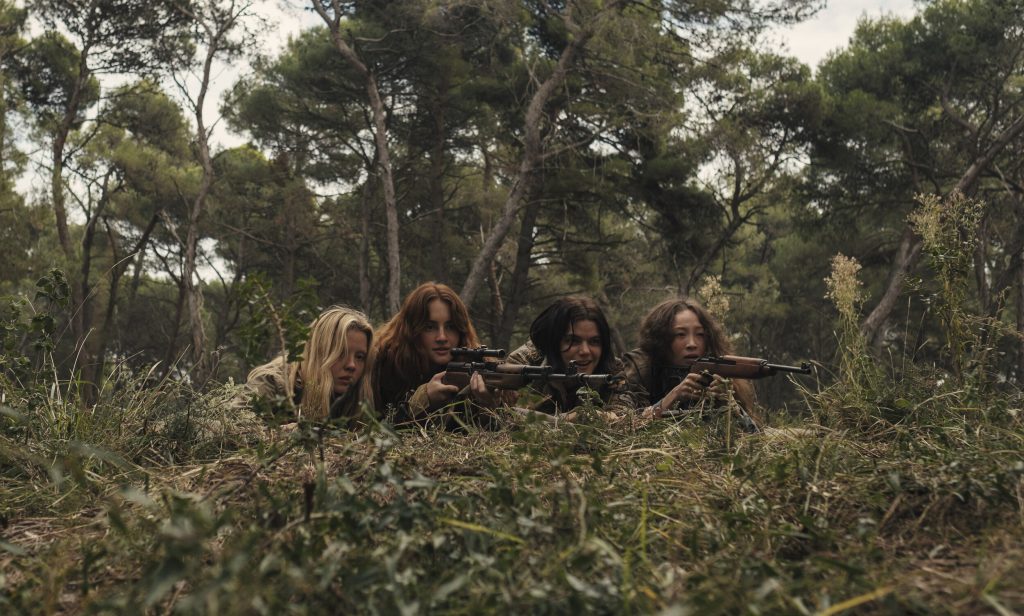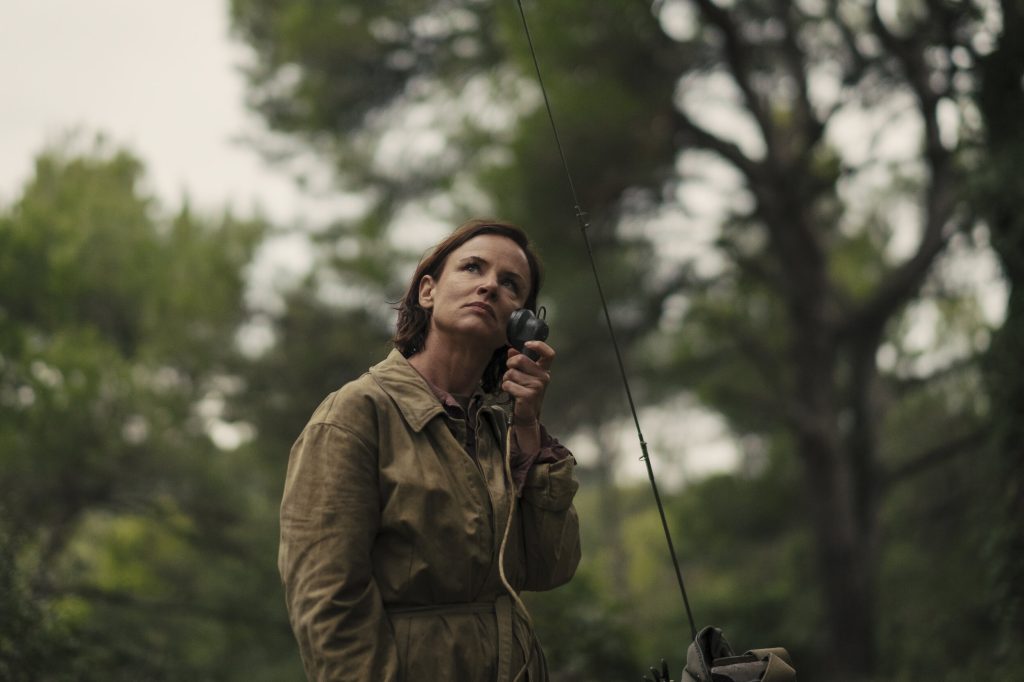January 7, 2021
by Carla Hay

Directed by Karen Cinorre
Culture Representation: Blurring the lines between reality and fantasy, the dramatic film “Mayday” features an almost all-white cast (with one Asian) representing the working-class, and middle-class.
Culture Clash: Four young women find themselves on a deserted island and go into combat in a war that’s supposed to represent a war against misogyny.
Culture Audience: “Mayday” will appeal mainly to people who are interested in pretentious movies that try to be clever with symbolism and alternate worlds but fall short in having interesting characters and a coherent plot.

Some movies take a potentially clever concept and bungle it with a lot of confusing scenes and boring pretension. “Mayday” is one of those misfires. The movie awkwardly mixes heavy-handed preachiness about misogyny with incoherent storytelling wrapped in a war movie. Once viewers understand all the symbolism in “Mayday,” the concept quickly wears thin and becomes an annoying chore to watch.
Written and directed by Karen Cinorre, “Mayday” begins by introducing a woman in her 20s named Anastacia, nicknamed Ana (played by Grace Van Patten), the story’s central character. Ana, who lives and works in an unnamed part of the U.S., is a waitress at an event hall that’s owned and managed by Russian men. She’s teetering on the edge of poverty because she’s been sleeping in her car. Her co-worker Dmitri (played by Théodore Pellerin), who’s a cook at this event hall, tells her one day: “No more nights in the car, Ana.”
Ana needs this job, but viewers soon see that it’s a horrible place to work. During a day when the employees are preparing for a wedding that will take place there, the head waiter (played by Frano Maskovic) takes Ana outside to berate her. Her pushes her up against the wall and yells at her: “Who do you think you are? Amateur!”
Ana goes into a back room for employees. The abusive co-worker follows her, goes into the room, and shuts the door. It’s not shown in the movie, but it’s implied that he has sexually assaulted Ana. This assault sends her into a spiral that’s the catalyst for what happens in the rest of the movie.
Before this assault happened, tension had already been brewing in the workplace on this day. The wedding’s bride and groom show up to check out the preparations. The groom (played by Hyoie O’Grady) is angry and impatient that things are running behind schedule. “Why aren’t you ready?” he yells at the workers.
The bride is a brunette named Marsha (played by Mia Goth), who’s upset and nervous. Marsha is comforted by an event hall employee named June (played by Juliette Lewis), who sees Marsha crying in the bathroom. “I know,” June tells Marsha. “It feels like a nightmare. That’s normal.”
Meanwhile, an ice swan has been prepared as part of the wedding decorations. When the abusive waiter orders Ana to bring the swan, she nervously drops it, and then she runs away. Ana goes into the kitchen and, in a dreamlike sequence, she crawls into the oven.
And the next thing you know, Ana (who’s still in her waitress outfit) is now on a very rocky island. She’s not alone though. Ana is woken up by Marsha, who is now a blonde. And then, Dimtri climbs out of the ocean, introduces himself as a pilot, and says that there’s a war going on. Ana doesn’t see him as her co-worker but as a total stranger, which is the first sign that she’s now in an alternate world. (“Mayday” was actually filmed in Croatia.)
Marsha then drives a motorcycle with Ana on the back. They go to a small inlet, where there’s an abandoned U-boat. Marsha and Ana go down the U-boat hatch, where they meet two other women who are also in their 20s: tough-talking Gert (played by Soko) and quiet Bea (played by Havana Rose Liu). “What brings you here?” Gert asks Ana. Ana replies, “I think I am bird watching.” Yes, it’s that kind of movie.
Marsha is no longer the insecure bride that she was in the other world. On this island, she’s a fearless warrior who teaches Ana how to swim and how to shoot guns. What is this war about and why are they fighting this war?
It becomes obvious when the battle scenes begin, and the four women are fighting against a male-only battalion. These men do not have names, but when Marsha’s angry groom shows up on the opposing side an airman, and the sexual assaulter/head waiter shows up as the opposing side’s submarine captain, you know that these men are supposed to represent misogyny and toxic masculinity.
And in case it wasn’t made clear enough, this conversation between Ana and Marsha spells it out: Ana tells Marsha, “I’ve never been in a war.” Marsha replies, “You’ve been in a war your whole life. You just don’t know it.”
Later, when Marsha teaches Ana how to be a sniper, Marsha says: “Girls make excellent snipers. Snipers endure uncomfortable positions for hours.” Ana replies, “I’m good at that.” Marsha then says, “They know how to make themselves invisible.” Ana adds, “I’m good at that too.”
Most of “Mayday” consists of tediously staged battle scenes and more incoherence. The four women send out distress signals to an entity called the Victory, which promises assistance that never comes. (The distress signal is “May, Alpha, Yankee, Delta, Alpha, Yankee,” which spells out as the acronym MAYDAY.) The Victory is an obvious metaphor for gender-equality initiatives that haven’t been made into laws. (The Equal Rights Amendment is one example.) June shows up later on the island, but she doesn’t add much to the story.
The problem with a misguided movie like “Mayday” is that it makes feminism look like all men are supposed to be the enemy. It doesn’t take into account that there are plenty of good men in the world who treat people with respect. There are plenty of men in the world who believe in gender equality, even though most societies are steeped in giving preference to men when it comes to power and money.
Even if “Mayday” wanted to be a war movie about women versus men, a major problem is that all of the movie’s characters are written with no real personalities. War movies shouldn’t just be about the battle scenes. Viewers have to care about the people in the war, in order to care about who wins or who loses. “Mayday” doesn’t really bother to show who any of these “heroines” really are. They just spout forgettable and often idiotic dialogue.
The message of “Mayday” is obvious to anyone who’s paying attention. But the message is delivered in such a clumsily sanctimonious way, it’s a real turnoff. And the end of the movie is an uninspired disappointment. Simply put: “Mayday” is the type of movie that gives feminism a bad name.
Magnolia Pictures released “Mayday” in select U.S. cinemas, on digital and VOD on October 1, 2021.
